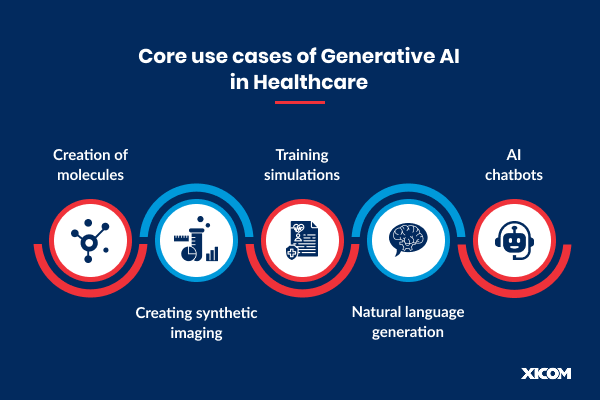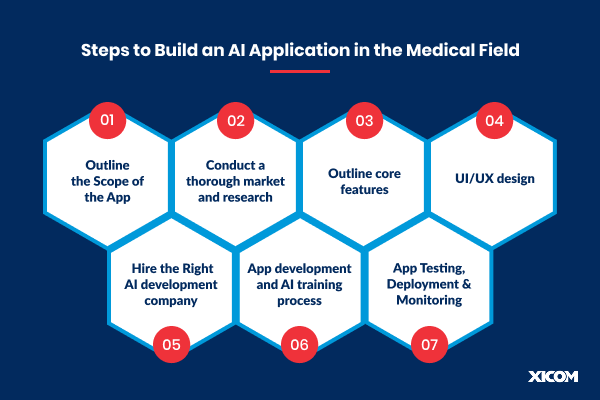Jul 18, 2025 Artificial Intelligence
AI in Medical: Transforming Medical Imaging and Drug Discovery
Jul 18, 2025 Artificial Intelligence
Table of Contents
Jul 18, 2025 Artificial Intelligence
Artificial Intelligence (AI) has emerged as a transformative force for most industries recently. The medical field remains no exception in this context. From transforming and revolutionizing disease diagnosis to accelerating the drug development process, AI in medical applications is pushing the boundaries of healthcare innovation.
AI’s convergence with medical imaging and drug discovery is leading to exceptional innovations that are reshaping treatment plans, scientific research, and clinical workflows, particularly.
Today, in this blog, we will explore how AI is facilitating transformations in the medical domain. Here, we will specifically focus on medical imaging and drug discovery aspects of the healthcare sector. Additionally, explore the following sections for insights into the role of Generative AI, the fundamentals of app development, business opportunities in the field, and ethical challenges, to help you understand why this is the ideal time to invest in this auspicious space.
Artificial intelligence (AI) technologies encompass deep learning, computer vision, machine learning, and NLP (Natural Language Processing), as well as the most recent development, Generative AI. These are driving intelligence, automation, and predictive analytics across various departments of the modern healthcare sector.
In the current world, AI stands as a clinical necessity and not just any other technological innovation or hype, as some reddit users are discussing, due to factors such as:

Source: Reddit
The key drivers for AI adoption are:
Hospitals, diagnostic labs, research institutes, and clinical institutions are increasingly embedding these technologies in their system.

The global artificial intelligence (AI) in healthcare market was valued at USD 21.66 billion in 2025 by Markets and Markets Research report. Furthermore, it is projected to grow at a CAGR of 38.6% and reach USD 110.61 billion by the end of 2030.
Healthcare providers are under substantial pressure with the growing incidence of chronic diseases and the increasing geriatric population. The world needs early detection of diseases such as cardiovascular diseases and dementia to save lives. Well, that is also the whole purpose of enabling intelligence in the systems.
Undoubtedly, the use of AI in medical imaging is one of the most successful use cases of AI in the healthcare domain. In the past, radiologists manually interpreted scans and X-rays, making this method highly time-consuming and prone to human error. Whereas, in the present scenario, AI can enhance imaging accuracy, help in the early detection of diseases, and reduce fatalities.
Hospitals that are utilizing AI in medical imaging are experiencing:
Some of the real-world examples of use of AI in medical imaging are:
The pharmaceutical industry has consistently faced one of its biggest challenges on the path to discovery: the lengthy and expensive process of drug development. However, it has finally started to embrace AI to overcome this challenge. With its new methodologies, AI not only accelerates the drug discovery process but also enhances the quality of outcomes simultaneously.
Companies that invest in AI for medical research witness quicker time to market drugs and a significant reduction in costs. It gives them a major competitive advantage in the market. Apart from this, hospitals and clinics are increasingly developing or looking for solutions for online appointment booking apps. Making doctor appointment booking app development another growing business opportunity for businesses looking to monetize this segment.
Role of Generative AI in Medical Advancements
Generative AI is working to reshape the entire healthcare sector. It is doing so by creating new designs, data, and content to help researchers, doctors, and developers overcome traditional barriers.

Core use cases of Generative AI in Healthcare:
The majority of leading hospitals are already leveraging generative AI development services to create personalized care experiences and enhance their administrative workflows. Along with this, Generative AI is empowering businesses to think of more healthcare business ideas to enter the bandwagon and leverage the power of it..
The integration of AI in the healthcare system brings a wide range of benefits that touch each layer of the healthcare system’s ecosystem, from hospitals and research laboratories to patients and policymakers. These benefits not only improve the delivery of health services but also address systemic challenges such as increasing costs, a lack of workforce, and clinical inefficiencies.
AI-enabled devices are trained on a vast dataset comprising medical images, clinical notes, and patient records, enabling them to detect patterns that human doctors can identify. This leads to much more clinical precision. For example, AI algorithms used in radiology can identify tumors, fractures, or unusual growth with more stability than traditional methods. AI also reduces the variability of diagnosis among different doctors, ensuring a more standardized and reliable clinical process.
AI streamlines repetitive tasks and reduces the time invested in administrative functions, such as patient registration, contract planning, medical record transcription, and requirements processing. AI development trends and the use of Natural Language Processing (NLP) algorithms convert doctor-patient calls into real-time, structured data. By automating these procedures, hospitals and clinics can enhance workflow efficiency, minimize clerical errors, and free up staff to focus on patient care.
AI can significantly reduce the cost of healthcare services by eliminating unnecessary testing, streamlining operational processes, and facilitating preventive care. Predictive analysis helps identify at-risk patients quickly, potentially avoiding expensive emergency treatment and hospitalization. AI in hospitals also optimizes resource allocation, including bed occupancy, inventory management, and staffing, leading to more informed budgeting and reduced overhead. These apps are easy to build and do not incur huge costs when compared to long-term benefits. Here is how you can build a medical app.
By activating early detection, risk stratification, and personalized treatment recommendations, AI directly helps improve patient outcomes. For example, AI can analyze genomic data to suggest the most effective cancer treatment for a specific patient. It monitors the post-depreciation through portable equipment and mobile apps, detects real-time complications, and inspires timely disruption that can save lives.
AI Chatbots, Virtual Health Assistant, and the Intelligent Trials system improve the delivery of external health services. These devices provide patients with preliminary assessment, medical advice, and mental health care at any time. AI analyzes patient data from wearable devices to assist doctors during virtual consultations. This ensures that high-quality care is available in remote or underserved areas, extending access to modern healthcare.
Artificial intelligence is playing a crucial role in enhancing the scope of medical education and devices. With the help of AI development services, hospitals, research labs, and institutions are working towards growing the spectrum of innovations in the field. Let us now understand how AI is transforming the domain.
AI is being rapidly adopted in the healthcare sector, opening up lucrative opportunities for startups, innovators, and enterprises alike. Businessmen looking to capitalize on this transformation have options to explore, including a wide variety of business models that combine artificial intelligence technologies with clinical research, patient care, diagnostics, and wellness management. Below are some customized business ideas for the medical AI landscape.
Suppose you want to break into this domain. In that case, it is intelligent to work with an experienced AI softeare development company to create a minimum viable product (MVP), and you can validate your idea and scale effectively. With the right technical partner, your concept can evolve into a powerful tool that enhances the delivery of healthcare services and improves patient outcomes.
Although when you hire software developers, they will guide you through the entire process of AI application development, gathering some information beforehand will prepare you for concrete meetings in the future.

Define your niche, such as medical imaging, billing system, medical education, diagnostic tools, or care delivery platforms.
Thoroughly study your market, target audience, users’ demographics, and ensure that your mobile app is compliant with regulations in the medical field, such as HIPAA in the USA, GDPR in Europe, and the FDA in the USA.
Choose essential features with AI in the medical field, such as predictive health insights, image analysis, AI chatbots, AI-enabled vitals tracking,and voice-to-text EMR updates.
Focus on building a seamless, intuitive, and easy-to-use navigation of the app frontend, along with a secure, scalable, and interoperable backend that adheres to existing medical standards.
Either collaborate with companies or hire app developers skilled with natural language processing NLP, UI/UX design of healthcare apps, and aware of compliances and regulations to set the foundation of your application correctly. Want to know more about the cost to hire app developers for development? Find here.
Build the app infrastructure with an app development company and then use vast medical datasets to train AI models. Apply this learning to diagnosis and classification, as well as natural language processing, for efficient medical documentation.
Once the app is fully developed, conduct thorough testing in controlled settings. Constantly monitor your app after deployment for compliance, model performance, reliability, and feedback.
Here are the leading platforms used by software development companies, enabling AI development in the medical field
| Platform | Key Features | Use Cases |
| TensorFlow | Open-source ML platform by Google | Medical image analysis, disease prediction |
| IBM Watson Health | NLP and cognitive computing platform | Oncology, clinical decision support |
| NVIDIA Clara | AI for medical imaging and genomics | Radiology workflows, federated learning |
| Google Cloud AI | Pre-trained models & tools | Chatbots, patient insights, EMR parsing |
| Microsoft Azure Health Bot | HIPAA-compliant AI platform | Symptom checker, patient engagement |
These platforms enable businesses to prototype and scale AI solutions rapidly. Consider leveraging machine learning development services to integrate these tools effectively.
Discover in the table below how AI is revolutionizing the medical sector and transforming its overall approach.
| Feature | Traditional Medicine | AI-Powered Medicine |
| Diagnostic Speed | Manual, slow | Real-time processing |
| Accuracy | Subjective, variable | Consistent, data-driven |
| Resource Use | Labor-intensive | Automated workflows |
| Personalization | Generalized treatments | Patient-specific insights |
| Cost | High, recurring | Lower long-term costs |
| Data Utilization | Underutilized | Fully optimized |
| Learning Curve | Requires experience | Adaptive & scalable |
As this comparison shows, AI in the medical field isn’t just a complementary tool – it’s a fundamental evolution that enhances clinical effectiveness and operational efficiency.
AI not only changes the health care system, but it also redefines it. From AI to medical imaging and diagnostics, and from AI to medical drug design and administrative automation, we see a fundamental shift in how healthcare services are delivered and consumed.
Whether you are a health institution, a medtech start, or a visionary entrepreneur, it is now time to collaborate with a specialist AI development company like Xicom Technologies. You can also hire artificial intelligence engineers with Xicom who can bring your idea to life and create a solution.
AI (artificial intelligence) in the medical field refers to the use of technologies, such as machine learning, computer vision, and NLP, for diagnosis, treatment, research, medical education, and the healthcare system to increase operational efficiency.
AI helps detect abnormalities in X-rays, MRI scans, CT scans, and ultrasound images, which are analyzed quickly and often more accurately than traditional methods. It supports early detection of diseases such as cancer and neurological disorders.
Yes. AI reinforces the discovery of drugs by identifying molecular targets, generating potential compounds, predicting their effects and side effects, and optimizing clinical studies. It reduces both the cost and time dramatically.
The cost of developing AI application varies depending on functions, complexity, and compliance requirements. A basic AI-medical app can range from $ 40,000 to $ 150,000+, which requires high investments for cloud infrastructure, security, and FDA certification with advanced apps.
Start with market research, define the purpose of your app, prepare core features, secure regulatory approval, and hire an experienced AI development company to build and launch your app.